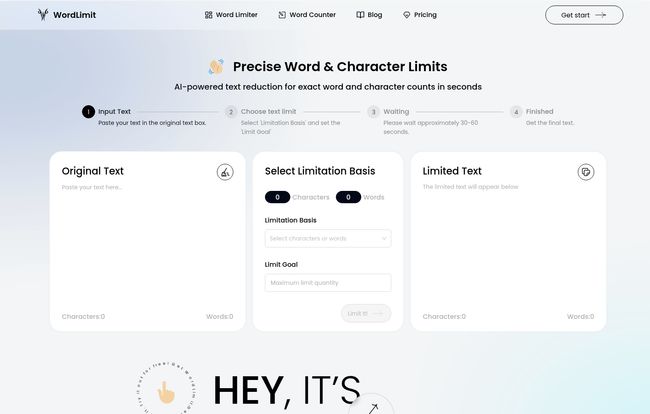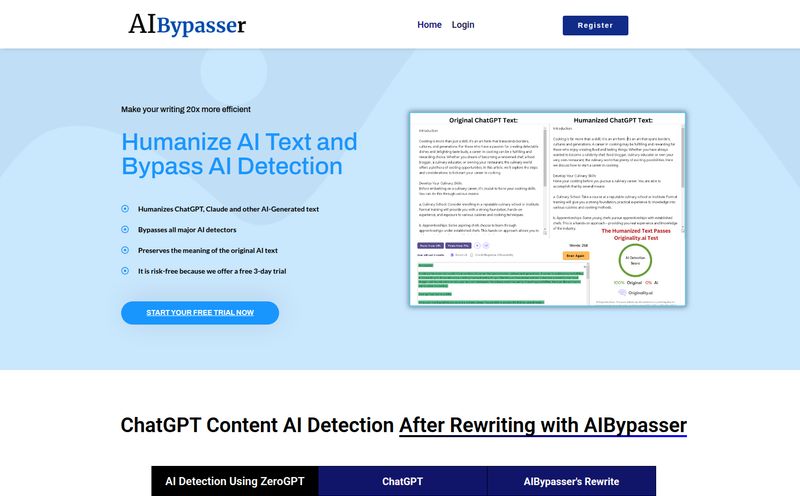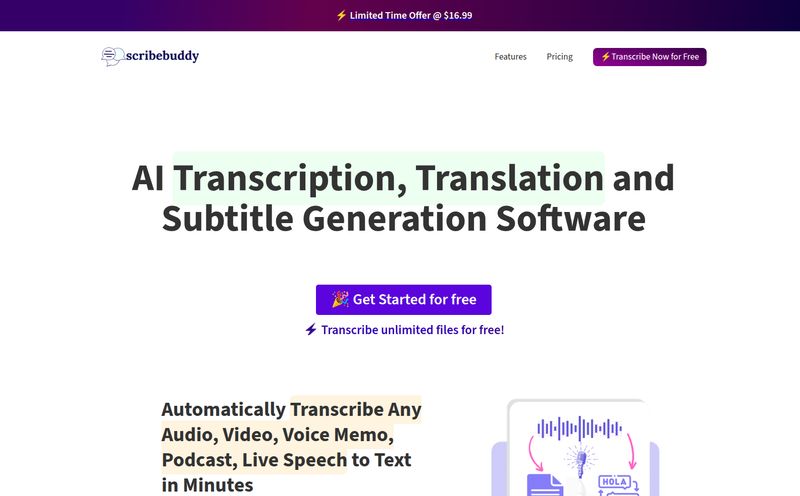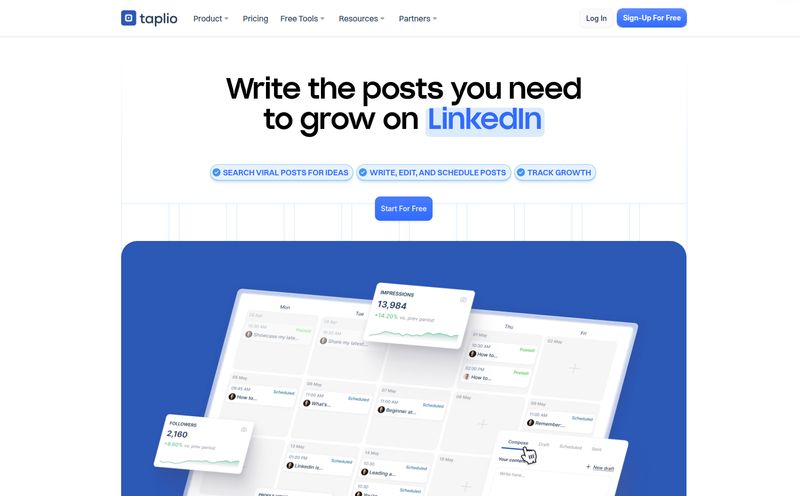We’ve all been there. Staring at the screen, heart sinking. You’ve just crafted the most perfect, eloquent, earth-shattering paragraph. It sings. It soars. And it’s 78 words over the limit. Curses.
Whether it’s a university paper abstract, a Google Ads description, or a pithy LinkedIn post, word and character limits are the tiny tyrants of the writing world. For years, the process was a painful one. A word-by-word execution, butchering your beautiful sentences, trying to find a synonym for “consequently” that’s four letters shorter. It’s a nightmare. It’s like trying to pack a suitcase for a two-week vacation, but you’re only allowed a handbag.
Then, AI paraphrasers came along, promising a quick fix. And let’s be real, they're… fine. Sometimes. But I’ve been in the content and SEO game long enough to see the fallout. These tools often act like a bad translator, stripping the soul from your text. Your unique voice? Gone. Replaced with a generic, slightly-off robotic tone. Even worse, in our world of Helpful Content Updates, that AI-generated footprint can be a real cause for concern. So we were stuck between manual surgery and robotic replacements. Until now, maybe.
I stumbled upon a tool called WordLimit that claims to be different. It doesn't want to rewrite your content. It just wants to make it… shorter. A text reducer, not a text generator. My curiosity was piqued.
So, What Exactly is WordLimit?
Think of it this way: most AI writing tools are painters, trying to create a new picture from a prompt. WordLimit is more like a sculptor. You give it a block of marble—your original text—and it carefully chips away the excess to reveal the statue hidden inside. It’s designed to hit a precise word or character count while fighting tooth and nail to preserve two things: your core message and your unique style.
This is the big promise. It trims the fat without touching the bone. It adjusts the length without injecting any new, AI-generated sentences, which means your writing should, in theory, remain authentically yours. No robotic aftertaste. No fear of being flagged by an AI detector. That's a bold claim in 2024.
My First Impressions: Putting WordLimit to the Test
The homepage is clean, no nonsense. I like that. The process looks ridiculously simple, broken down into four steps. So, I grabbed a chunk of text from a recent blog post—about 600 words—and decided to see if I could shrink it to 450 without it sounding like a caveman wrote it.
Step 1 & 2: Paste and Set the Limit. Easy enough. I pasted my text into the “Original Text” box. Then, you choose your limitation basis: Characters or Words. I selected “Words” and punched in “450.” The interface is intuitive, no user manual needed, thank goodness.

Visit WordLimit
Step 3: Process. I clicked the button and… waited. The tool states it takes about 30-60 seconds. It’s not instant, and in our age of instant gratification, that can feel like an eternity. But it's just enough time to take a sip of coffee and question your life choices. I can live with that.
Step 4: Get the Result. The limited text appeared on the right. I braced myself. And you know what? It was impressive. The core arguments were still there. The key examples I used were intact. The flow was a little different, sure, but it didn't sound like a stranger wrote it. It still sounded like me. Just… a more concise version of me. The version of me who gets to the point a bit faster.
The Features That Actually Matter to a Writer
Let's break down what makes this thing tick, because the magic is in the details.
Preserving Your Unique Voice (This isn't just another spinner)
This is the standout feature for me. I've used plenty of paraphrasing tools that churn out grammatically correct but sterile content. They have a tendency to sand down all the interesting edges of your writing. WordLimit, by focusing on reduction, seems to keep the writer’s DNA. It retains your sentence structures, your word choices, your little quirks. My slightly sarcastic tone? It was still there. That’s huge.
Keeping the Important Stuff In
The tool claims to prioritize “essential elements like key facts, names, citations, and central arguments.” In my test, this held up. It was smart enough to see which sentences carried the most weight and which were more like fluffy supporting characters. For academic writers, researchers, or even journalists who need to cut a story for print while keeping quotes and data, this is absolutely critical. It’s the difference between a useful tool and a destructive one.
Dodging the AI Detection Bullet
Okay, let's talk about the elephant in the room: AI content and Google. While Google's official stance, according to folks like John Mueller, is that they reward good content regardless of how it’s produced, there's still a lot of fear and uncertainty in the SEO community. Many of us are wary of tools that leave a heavy AI footprint. Because WordLimit’s whole philosophy is to reduce your human-written text rather than generate new text, it sidesteps this issue beautifully. The output is your work, just condensed. It’s a subtle but massive distinction.
But It's Not Perfect, Right? A Look at the Downsides
No tool is perfect, and it’s important to be honest about the limitations. Blindly praising anything is how you end up with a garage full of useless gadgets.
First, the obvious. If you push it too hard, quality will suffer. That’s not a flaw in the tool, its just physics. If you ask it to shrink a 1,000-word essay down to 150 words, you’re going to lose vital information and context. It’s a precision instrument, not a magic wand. You have to be realistic with your reduction goals.
Second, the 30-60 second wait time can be a drag if you're in a real hurry and doing multiple revisions. Again, not a dealbreaker, but something to be aware of.
And a minor niggle I found: the slider on the Lite plan for adjusting word count isn't as precise as just typing in a number. It’s a small user experience detail that could be polished, but it hardly sinks the ship.
Let's Talk Money: WordLimit Pricing Explained
The pricing structure is straightforward, which I appreciate. They have a plan for pretty much everyone, from the broke student to the massive content agency.
| Plan | Price | Best For |
|---|---|---|
| Free | $0/month | Casual users, students, or anyone wanting to test the waters. You get 250 free credits and can process up to 1000 words at a time. |
| Lite | $9.99/month | Freelance writers, bloggers, and SEO pros. This seems to be the sweet spot, with a much higher volume of credits and the ability to process huge documents (up to 100,000 words). |
| Enterprise | Contact for pricing | Large teams and agencies needing API access, custom volume, and dedicated support. |
For the most current details, you should always check their official pricing page.
The Final Verdict: Is WordLimit Worth Adding to Your Toolkit?
So, here’s my final take. WordLimit isn't trying to be a one-stop-shop AI content solution. It's not a Swiss Army knife. It’s a digital scalpel, designed for one specific, often infuriating, task: precise text reduction.
And at that one job, it's remarkably good. It solves a problem that every single writer faces, and it does so in a way that respects the writer's work. The commitment to maintaining a human voice and avoiding AI-generation is what sets it apart in a very crowded market.
Is it for everyone? If you never face word limits, then no. But for students, academics, copywriters, SEOs, and social media managers, this tool could be a genuine lifesaver. It turns a frustrating editing task into a simple, quick process. For me, it's earned a spot in my bookmarks. It's a specialist, and sometimes, a specialist is exactly what you need.
Frequently Asked Questions about WordLimit
- Will WordLimit get my content flagged as AI?
- It's highly unlikely. The tool works by reducing and rearranging your own human-written sentences, not by generating new AI text. The final output is still fundamentally your work, just more concise.
- Can WordLimit actually rewrite my text for clarity or tone?
- No, and that's its main feature. WordLimit is not a paraphraser or a rewriting tool. It is designed specifically to shorten your text while preserving the original tone and style as much as possible.
- What's the difference between WordLimit and a paraphrasing tool?
- A paraphraser (like Quillbot) ingests your text and generates entirely new sentences to say the same thing, often altering your voice. WordLimit strategically removes words, phrases, and sentences from your original text to meet a count, keeping your authentic voice intact.
- Is the Free plan good enough to start with?
- Absolutely. The free plan offers 250 credits and lets you process up to 1000 words at a time. It’s more than enough to handle a few assignments or social media posts and decide if the tool fits your workflow before committing to a paid plan.
- How does WordLimit decide what information is "key"?
- While the exact algorithm is proprietary, it uses an AI model trained to identify sentence structures, proper nouns (names, places), data, citations, and clauses that carry the primary argument of the text. It then prioritizes keeping these elements over more descriptive or redundant language.
Reference and Sources
- WordLimit Official Website: https://wordlimit.ai/
- WordLimit Pricing Page: https://wordlimit.ai/pricing
- Google's Guidance on AI-Generated Content: https://developers.google.com/search/docs/crawling-indexing/ai-generated-content



